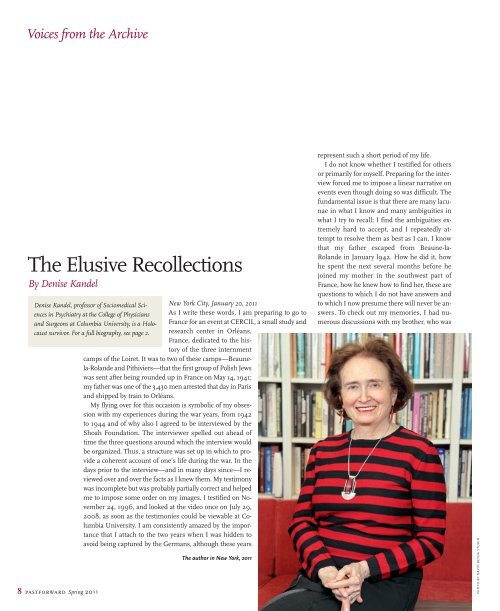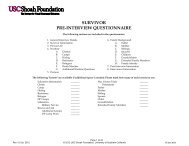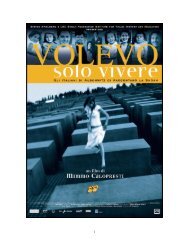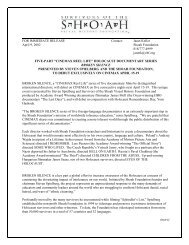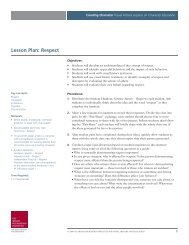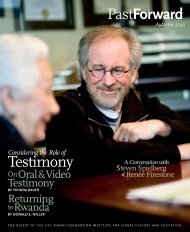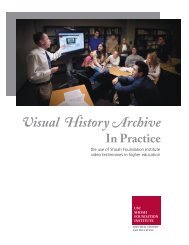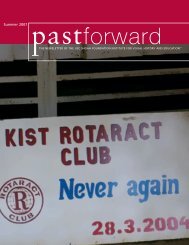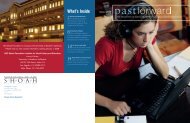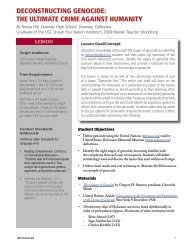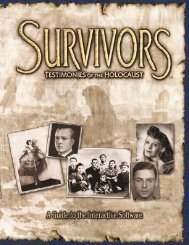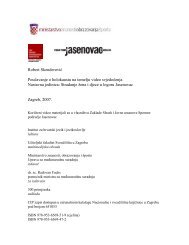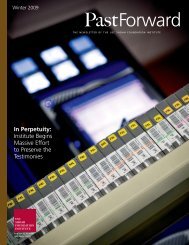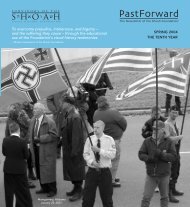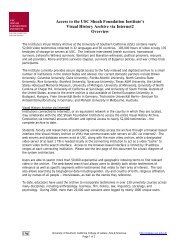Insights - USC Shoah Foundation - University of Southern California
Insights - USC Shoah Foundation - University of Southern California
Insights - USC Shoah Foundation - University of Southern California
Create successful ePaper yourself
Turn your PDF publications into a flip-book with our unique Google optimized e-Paper software.
Voices from the Archive<br />
The Elusive Recollections<br />
By Denise Kandel<br />
Denise Kandel, pr<strong>of</strong>essor <strong>of</strong> Sociomedical Sciences<br />
in Psychiatry at the College <strong>of</strong> Physicians As I write these words, I am preparing to go to<br />
New York City, January 20, 2011<br />
and Surgeons at Columbia <strong>University</strong>, is a Holocaust<br />
survivor. For a full biography, see page 2. research center in Orléans,<br />
France for an event at CERCIL, a small study and<br />
France, dedicated to the history<br />
<strong>of</strong> the three internment<br />
camps <strong>of</strong> the Loiret. It was to two <strong>of</strong> these camps—Beaunela-Rolande<br />
and Pithiviers—that the first group <strong>of</strong> Polish Jews<br />
was sent after being rounded up in France on May 14, 1941;<br />
my father was one <strong>of</strong> the 3,430 men arrested that day in Paris<br />
and shipped by train to Orléans.<br />
My flying over for this occasion is symbolic <strong>of</strong> my obsession<br />
with my experiences during the war years, from 1942<br />
to 1944 and <strong>of</strong> why also I agreed to be interviewed by the<br />
<strong>Shoah</strong> <strong>Foundation</strong>. The interviewer spelled out ahead <strong>of</strong><br />
time the three questions around which the interview would<br />
be organized. Thus, a structure was set up in which to provide<br />
a coherent account <strong>of</strong> one’s life during the war. In the<br />
days prior to the interview—and in many days since—I reviewed<br />
over and over the facts as I knew them. My testimony<br />
was incomplete but was probably partially correct and helped<br />
me to impose some order on my images. I testified on November<br />
24, 1996, and looked at the video once on July 29,<br />
2008, as soon as the testimonies could be viewable at Columbia<br />
<strong>University</strong>. I am consistently amazed by the importance<br />
that I attach to the two years when I was hidden to<br />
avoid being captured by the Germans, although these years<br />
8 pastforward Spring 2011<br />
The author in New York, 2011<br />
represent such a short period <strong>of</strong> my life.<br />
I do not know whether I testified for others<br />
or primarily for myself. Preparing for the interview<br />
forced me to impose a linear narrative on<br />
events even though doing so was difficult. The<br />
fundamental issue is that there are many lacunae<br />
in what I know and many ambiguities in<br />
what I try to recall; I find the ambiguities extremely<br />
hard to accept, and I repeatedly attempt<br />
to resolve them as best as I can. I know<br />
that my father escaped from Beaune-la-<br />
Rolande in January l942. How he did it, how<br />
he spent the next several months before he<br />
joined my mother in the southwest part <strong>of</strong><br />
France, how he knew how to find her, these are<br />
questions to which I do not have answers and<br />
to which I now presume there will never be answers.<br />
To check out my memories, I had numerous<br />
discussions with my brother, who was<br />
PHOTO BY DAVID BEYDA STUDIO


